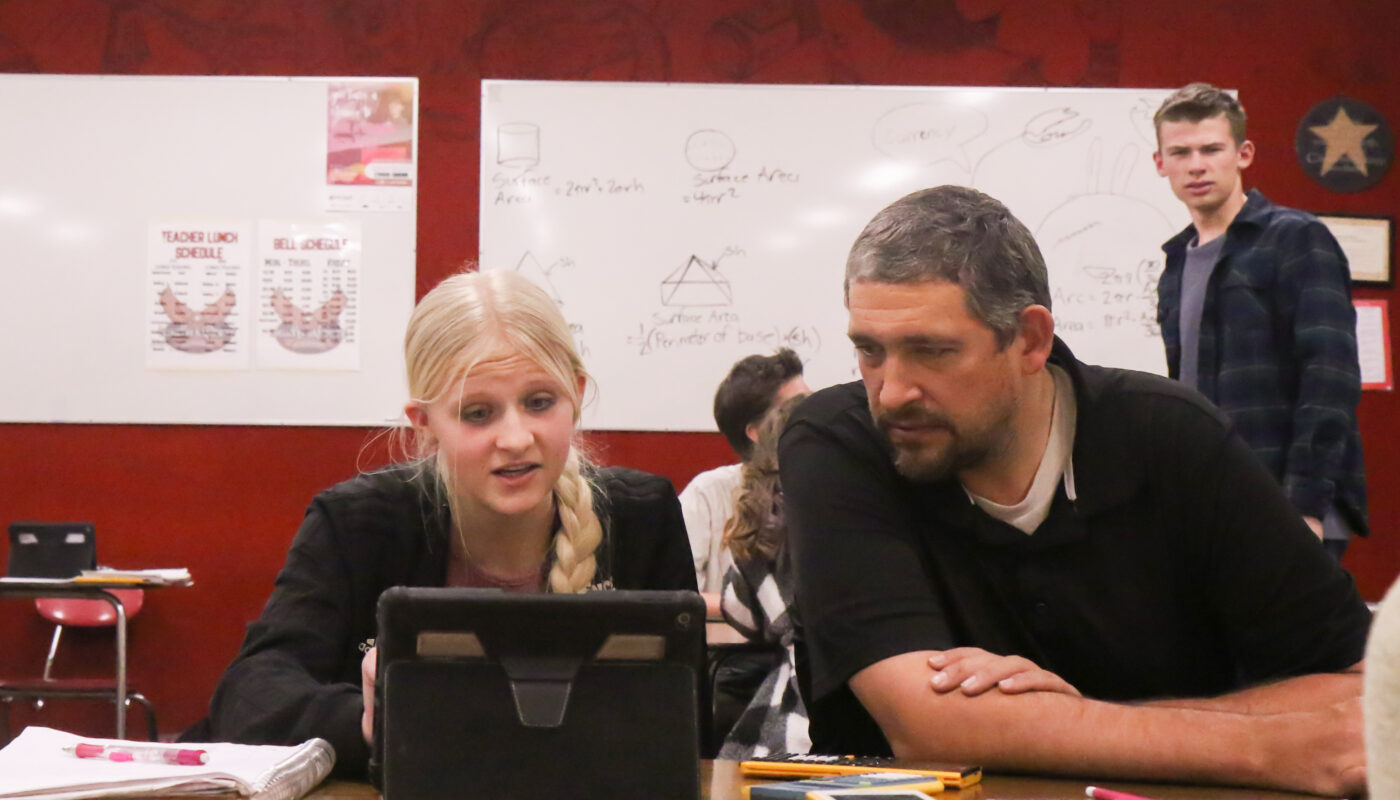photo by Adelheide Johansen – Math teacher Matt Syme helps students on the online math program ALEKS.
by Aidan Inglish
Staff Reporter
Exercise is essential for all ages, and is a big part of the way the body operates. Most NS students understand this, as nearly 85% of students surveyed exercise anywhere from 2 to 7 days a week. For high school students, exercise is a way to stay physically fit and decrease stress.
Exercise helps keep the heart pumping and blood flowing, and helps prevent diseases, including type two diabetes, cardiovascular diseases, and some cancers.
“We gain strength by adapting to new workloads and stress loads onto the body,” said school athletic trainer Jamie Withers. “So if you stop meeting that threshold now the body doesn’t have to keep up with those stresses, so muscle goes away, it starts to atrophy… if we don’t practice on how to efficiently move then we become kind of stationary.”
Exercise also has the power to impact our mental state, by reducing anxiety or stress or by acting as a distraction.
“It can relieve stress,” said Taylor Christensen, a health and fitness teacher and the girls basketball coach at NS. “And it helps you get your mind off of things that are going on in your life. You have however long you go and workout for, half-hour, an hour, two hours–whatever you wanna do–but it gives them a chance to get away from their life a bit and just gets some physical activity that releases endorphins and stuff like that.”
The recommended amount of exercise is 150 minutes a week, but that isn’t the perfect amount for everyone. It depends on the person, different people and different bodies need different amounts of exercise.
“Your heart is a muscle and it needs to be exercised,” Withers said. “It needs to be worked, so you do have to get where you’re doing fitness that increases your heart rate and that you’re doing for an extended period of time for so many days a week to be considered in a healthy range.”
You have to be careful though, and not exercise more than your body can handle in order to avoid trauma or injury.
“If you are overworking your body and not taking care of it in recovering and not giving it the nutrients it needs, then yeah, your body’s going to start breaking down and you’re gonna see injuries,” Christensen said, “that’s where it’s really important to read your body and see how you are feeling.”
You also have to be cautious to do the exercises correctly, because doing an exercise the wrong way can also be damaging and unproductive.
“Say you are exercising and you are doing a squat incorrectly,” Christensen said, “you could hurt your back, you could hurt your knees, and that’s just going to keep you from exercising longer, and injuries going to keep you from the exercises you want.”
Which is why it is important to learn the exercises properly from the start, so your body doesn’t adapt to doing the exercise incorrectly.
“For a beginner, I would say probably get someone that is experienced to help you learn,” Christensen said. “A spotter is great, going to a class to help you learn what the correct way to do a certain lift would be. But you could Youtube things, you could have someone help you, there’s a lot of ways you can figure out how to perform exercises properly or correctly.”
However, it can be hard to find the motivation to exercise. For some students knowing effort will need to be put in makes exercising a hard decision to make, especially when there are limited options.
“As far as kids not wanting to [exercise],” Withers said, “maybe they just haven’t been exposed or been able to participate in something they really enjoy. Because they had 10 options, but there’s a thousand out there, they were only exposed to 10 things… Maybe they just need to find the one that’s worth putting the effort in, that’s worth getting my heart rate up, or that’s worth getting sweaty.”
Every individual can find a type of exercise that is right for them.
“It doesn’t have to be ‘Oh I’m gonna run six miles,’ or ‘I’m gonna go lift this,’” said senior Natalya Benson. “It can be hiking, it can be walking your dog, all that is still exercising—it’s just finding the thing you like to do and doing it.”
Once you find a sport or exercise you enjoy, it can become a part of your life or your routine.
“There are a lot of ways to get exercise these days,” Christensen said. “You can do spinning, you can do weight training, you can compete in marathons, right? I think whatever way you choose to get your exercise probably turns into a lifestyle for some people.”



